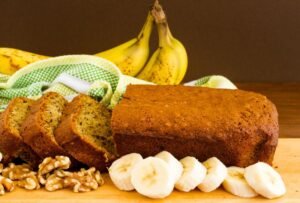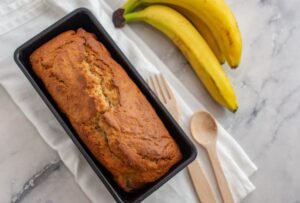How does fiber content in bananas impact banana bread digestion?

How does fiber content in bananas impact banana bread digestion?
Introduction
Every banana bread lover knows the crucial role that bananas play in creating that perfect loaf. Yet, the benefits of the humble banana go beyond just flavor and texture in our favorite bakery treat. Among the numerous health benefits of bananas, one that stands out is its high fiber content. But how does this fiber impact banana bread digestion? Let’s dive into the intimate connection between bananas, fiber, and your digestive system.
Fiber Content in Bananas
The average medium-sized banana contains approximately 3 grams of fiber. This accounts for about 10% of your recommended daily intake of fiber. The fiber in bananas is primarily insoluble, but it also contains a good amount of soluble fiber. Both types of fiber are important for promoting healthy digestion, but they do so in slightly different ways.
Insoluble Fiber
Insoluble fiber aids digestion through adding bulk to the stool and helping food pass more quickly through the stomach and intestines. This can help prevent constipation and improve overall digestive health.
Soluble Fiber
On the other hand, soluble fiber absorbs water and forms a gel-like substance in the intestines. This slows down digestion, allowing your body to absorb all the nutrients from the food. It also helps control blood sugar levels by slowing the absorption of sugar.
The Impact of Banana’s Fiber on Banana Bread Digestion
Given the high fiber content in bananas, it’s no surprise that banana bread, when made with whole, ripe bananas, can be a good source of fiber too. But how does this fiber affect the digestion of banana bread?
Improved Digestive Health
First off, fiber is beneficial for our digestive systems because it adds bulk to our food, meaning it takes up more space in our stomachs, causing us to feel fuller for longer. Thus, banana bread can be an excellent option for a filling and hearty snack or breakfast option.
Regulation of Blood Sugar Levels
Second, the soluble fiber in bananas can help regulate your body’s blood sugar levels. By slowing digestion, soluble fiber prevents blood sugar levels from spiking after a meal or snack. This makes banana bread a potentially good option for individuals looking to manage their blood sugar levels.
Weight Management
Finally, the high fiber content in banana bread made from whole bananas can contribute to weight management by giving a feeling of fullness and slowing the rate of digestion, thereby avoiding the sensation of constant hunger.
Take Home Message
Although it might seem mundane, the humble banana – and by extension, banana bread – has a lot to offer in terms of fiber content and promoting healthy digestion. Whether you’re looking for a delicious snack that keeps you full, wanting to manage your blood sugar levels, or trying to add more fiber to your diet for overall health, it’s hard to go wrong with banana bread.
However, do remember that not all banana breads are created equal. Some commercially available banana bread may be high in added sugars or fats, which can offset some of the potential health benefits of the fiber. So, it’s always a good idea to try baking your own banana bread at home, using whole, ripe bananas to get the maximum fiber benefits.
Now that you know the wonders of banana bread and all its fibrous glory, why not take your love for banana bread a step further by incorporating it into your diet? Who knew that something so delectable could be not only a treat for your taste buds but also a boon for your digestive system?

Learn More
Conclusão:
Conclusion
Overall, the fiber content in bananas significantly impacts the digestion of banana bread. Going beyond the delightful taste and pleasant aroma, the high fiber content in bananas promotes better digestion and significantly contributes to the overall health benefits of banana bread. This complex carbohydrate not only slows down digestion, reducing blood sugar spikes, but also imparts a lasting feeling of fullness, thereby aiding in weight management. As fiber isn’t readily absorbed by the body, it adds bulk to the diet, promoting regular bowel movements and overall gut health. In conclusion, incorporating banana bread into the diet is a tasty and healthy way to increase fiber intake.
Perguntas e Respostas:
FAQs
1. What role does fiber play in digestion?
Fiber adds bulk to the diet, aiding in digestion by helping food pass smoothly through the digestive system, promoting regular bowel movements and preventing constipation.
2. How does the fiber in bananas affect banana bread digestion?
The fiber content in bananas slows down the digestion of banana bread, leading to a more steady absorption of sugars into the bloodstream, thus avoiding spikes in blood sugar levels.
3. How much fiber does a banana add to the bread?
A medium-size banana contains about 3 grams of fiber. This amount can add significant fiber content to the bread, improving its digestion.
4. Does banana bread benefit overall health?
Yes, beyond aiding digestion, banana bread also contributes to overall health by providing essential nutrients like potassium and vitamin B6, while also helping in weight management due to its high fiber content.
5. Does cooking affect the fiber content of bananas?
No, cooking or baking does not significantly degrade the fiber content of bananas, therefore, the beneficial fiber content is retained in banana bread.
6. Are there other foods that can increase the fiber content of banana bread?
Yes, ingredients like nuts, whole grains or other fiber-rich fruits can be added to increase the fiber content of banana bread.
7. How can I incorporate banana bread into my diet?
One can incorporate banana bread into their diet as a breakfast item, a snack in between meals or even as a dessert due to its nourishing, delightful taste and high fiber content.
How does fiber content in bananas impact banana bread digestion?

When you make purchases through the links available on our site, we may receive an affiliate commission at no additional cost to you.



